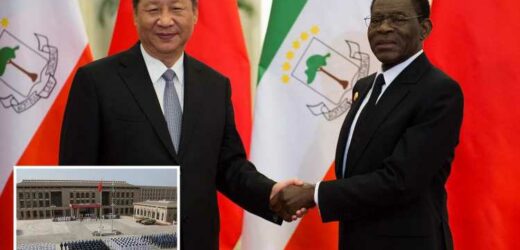CHINA is planning to dominate the Atlantic Ocean with new naval bases for warships and submarines on the west coast of Africa, U.S intelligence officials have claimed.
A senior official from the Biden Administration said that Beijing intends to establish its first permanent military presence off the coast of Equatorial Guinea.
Intelligence chiefs believe that China's president, Xi Jinping, is hoping to convince the leader of the African country of converting the existing port of Bata into a military base.
"As part of our diplomacy to address maritime-security issues, we have made clear to Equatorial Guinea that certain potential steps involving [Chinese] activity there would raise national-security concerns," the source told The Wall Street Journal.
In 2009, China built up a commercial port in Bata – one of the country's biggest cities on the mainland.
In October, Biden's Deputy National Security Advisor, Jonathan Finer, was sent to Equatorial Guinea to speak to President Teodoro Obiang Nguema Mbasogo about the urgent matter.
However, the 72-year-old President sent his son to meet with Finer instead.
Following the visit, the apparent heir posted a video to Instagram to thank Finer for the visit on October 19.
A week later, the son tweeted his thanks to a Chinese delegation for the support for his country.
At the end of this month, a senior official from Equatorial Guinea will travel to Senegal to attend the China-Africa forum.
Previously, China approached countries stretching from Mauritania to the south of Namibia, intent on establishing a naval facility.
If realized, that prospect would enable China to base warships in its expanding Navy in the Atlantic as well as Pacific oceans.
Back in May, U.S. Gen. Stephen Townsend, who heads the U.S. Africa Command, confirmed reports that China was looking to establish a large navy port on the continent’s western coast.
"They're looking for a place where they can rearm and repair warships," he told The Sun Online.
"That becomes militarily useful in conflict. They're a long way toward establishing that in Djibouti.
"Now they are casting their gaze to the Atlantic coast and wanting to get such a base there."
China's first overseas naval base was built years ago in Djibouti in the Horn of Africa and it is steadily increasing its capacity.
Gen. Townsend said as many as 2,000 military personnel are at the base, including hundreds of Marines who handle security there.
He said: "They have arms and munitions for sure. They have armored combat vehicles.
"We think they will soon be basing helicopters there to potentially include attack helicopters."
They are hedging their bets and making big bets on Africa
For some time, many have thought that China was working to establish a Navy base in Tanzania, a country on Africa's eastern coast, that has had a strong, long-standing military relationship with Beijing.
"The Chinese are outmanoeuvring the U.S. in select countries in Africa,"Gen Townsend said.
"Port projects, economic endeavours, infrastructure and their agreements and contracts will lead to greater access in the future.
"They are hedging their bets and making big bets on Africa."
The Defense Department's 2020 report on China's military power, said China has likely considered adding military facilities to support its naval, air and ground forces in Angola, among other locations.
And it noted that the large amount of oil and liquefied natural gas imported from Africa and the Middle East, make those regions a high priority for China over the next 15 years.
Henry Tugendhat, a senior policy analyst with the United States Institute of Peace, said China has a lot of economic interests on Africa's west coast, including fishing and oil.
It also has helped finance and build a large commercial port in Cameroon.
Mr Tugendhat said that any effort by Beijing to get a naval port on the Atlantic coast would be an expansion of China's military presence.
But the desire for ocean access, he said, may be primarily for economic gain, rather than military capabilities.
Gen. Townsend and other regional military commanders laid out their concerns about China during recent congressional hearings.
Source: Read Full Article






